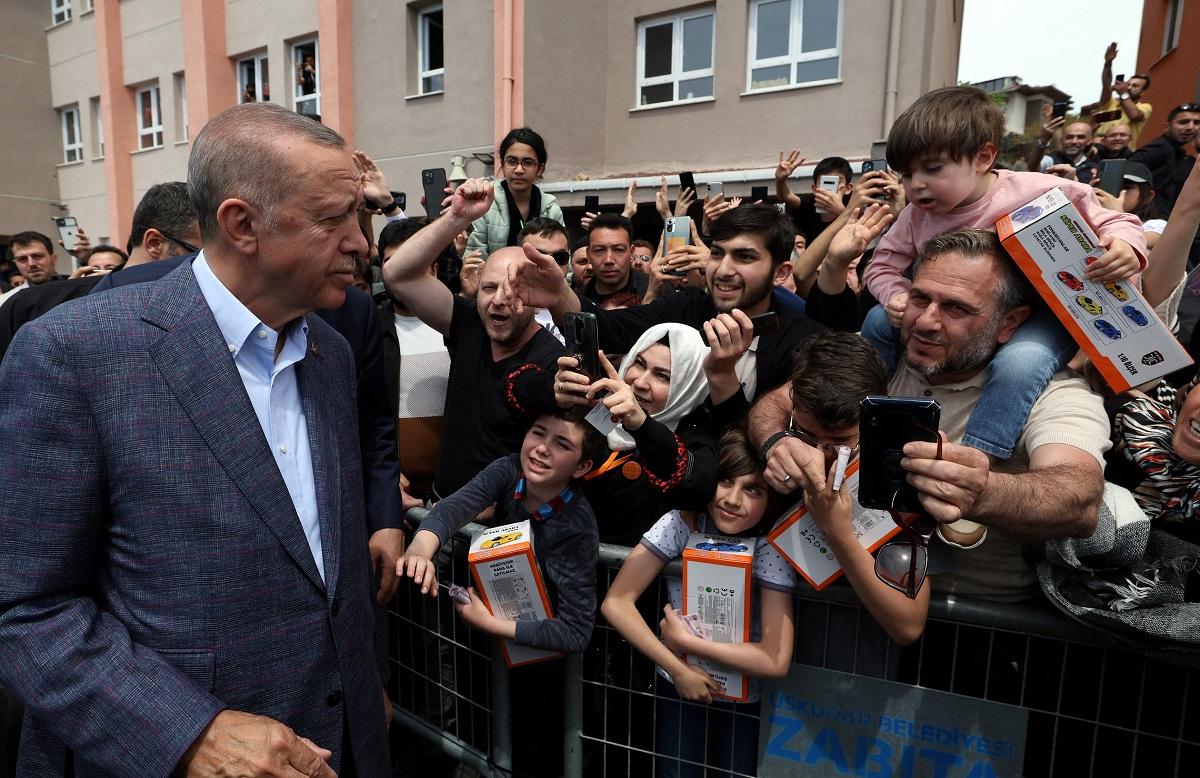Erdogan has initial lead in Turkey election but gap expected to narrow

ANKAR — Early results from Turkey's presidential election on Sunday showed President Tayyip Erdogan well ahead with 59.47% of votes compared to opposition rival Kemal Kilicdaroglu with 34.79%, although the gap was expected to narrow as more votes are counted.
Broadcaster HaberTurk gave the results based on a count of 9.1% of ballot boxes.
Initial results were expected to be favorable for Erdogan, as many of the first counts typically come from his conservative, rural heartland.
Four sources from Turkey's opposition said they believed Kilicdaroglu was ahead by a narrow margin.
Sunday's vote is one of the most consequential elections in the country's 100-year history, a contest that could end Erdogan's imperious 20-year rule and reverberate well beyond Turkey's borders.
Opinion polls before the election had given Kilicdaroglu, who heads a six-party alliance, a slight lead, with two polls on Friday showing him above the 50% threshold needed to win outright. If neither wins more than 50% of the vote, a runoff will be held on May 28.
The presidential vote will decide not only who leads Turkey, a NATO-member country of 85 million, but also how it is governed, where its economy is headed amid a deep cost of living crisis, and the shape of its foreign policy.
Polling stations officially closed at 5 p.m. (1400 GMT) after nine hours of voting.
The elections, which are also for parliament, are being intently watched in Western capitals, the Middle East, NATO and Moscow.
A defeat for Erdogan, one of President Vladimir Putin's most important allies, will likely unnerve the Kremlin but comfort the Biden administration, as well as many European and Middle Eastern leaders who had troubled relations with Erdogan.
Turkey's longest-serving leader has turned the NATO member and Europe's second largest country into a global player, modernized it through megaprojects such as new bridges, hospitals and airports, and built a military industry sought by foreign states.
But his volatile economic policy of low interest rates, which set off a spiraling cost of living crisis and inflation, left him prey to voters' anger. His government's slow response to a devastating earthquake in southeast Turkey that killed 50,000 people added to voters' dismay.
Kilicdaroglu has pledged to set Turkey on a new course by reviving democracy after years of state repression, returning to orthodox economic policies, empowering institutions who lost autonomy under Erdogan's tight grasp and rebuilding frail ties with the West.
Thousands of political prisoners and activists, including high level names such as Kurdish leader Selahattin Demirtas and philanthropist Osman Kavala, could be released if the opposition prevails.
Polarized politics
"I see these elections as a choice between democracy and dictatorship," said Ahmet Kalkan, 64, as he voted in Istanbul for Kilicdaroglu, echoing critics who fear Erdogan will govern ever more autocratically if he wins.
"I chose democracy and I hope that my country chooses democracy," said Kalkan, a retired health sector worker.
Erdogan, 69, is a veteran of a dozen election victories, and says he respects democracy and denies being a dictator.
Illustrating how the president still commands support, Mehmet Akif Kahraman, also voting in Istanbul, said Erdogan still represented the future even after two decades in power.
"God willing, Turkey will be a world leader," he said.
The parliamentary vote is a tight race between the People's Alliance comprising Erdogan's Islamist-rooted AK Party (AKP) and the nationalist MHP and others, and Kilicdaroglu's Nation Alliance formed of six opposition parties, including his secularist Republican People's Party (CHP), established by Turkey's founder Mustafa Kemal Ataturk.
With almost 13% of ballot boxes counted, CNNTurk put Erdogan's alliance on 67% and the opposition alliance on 22% in the parliamentary vote.
Change or continuity
Erdogan, a powerful orator and master campaigner, has pulled out all the stops on the campaign trail. He commands fierce loyalty from pious Turks who once felt disenfranchised in secular Turkey and his political career has survived an attempted coup in 2016, and numerous corruption scandals.
However, if Turks do oust Erdogan it will be largely because they saw their prosperity and ability to meet basic needs decline, with inflation that topped 85% in Oct. 2022 and a collapse in the lira currency.
Kilicdaroglu says he would seek to return Turkey to the parliamentary system of governance, from Erdogan's executive presidential system passed in a referendum in 2017. He has also promised to restore the independence of a judiciary that critics say Erdogan has used to crack down on dissent.
Erdogan has taken tight control of most of Turkey's institutions and sidelined liberals and critics. Human Rights Watch, in its World Report 2022, said Erdogan's government has set back Turkey's human rights record by decades.
Kurdish voters, who account for 15-20% of the electorate, will play a vital role, with the Nation Alliance unlikely to attain a parliamentary majority by itself.
The pro-Kurdish Peoples' Democratic Party (HDP) is not part of the main opposition alliance but fiercely opposes Erdogan after a crackdown on its members in recent years. — Reuters



